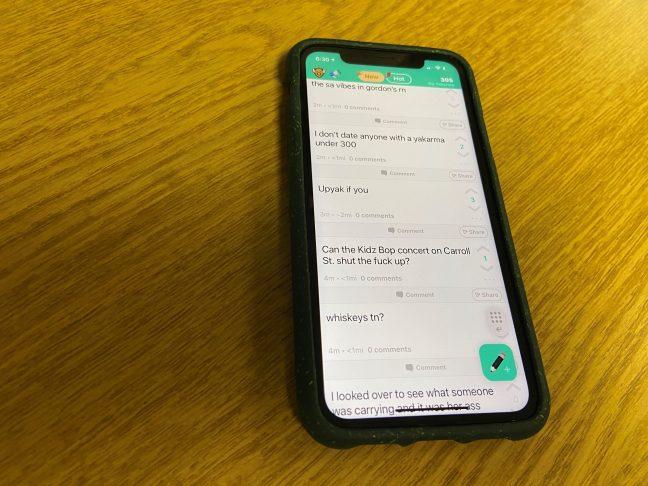Yik Yak, a social media app that has come back online after a four-year hiatus, is unlike its competitors.
The app relies on anonymity, meaning there are no followers, profiles or any way to see who you’re communicating with —only up-Yaks, down-Yaks and individual creativity.
According to an NPR article, the app was first released in 2013 but received complaints about threats of violence and hate speech that happened under its anonymous design.
The app was eventually shut down in 2017 for a mix of hate speech concerns and a steep decline in engagement. It came back on the app store last month after new owners acquired the company and instituted stronger ban tactics for problematic users.
On a college campus like University of Wisconsin, it is no surprise that Yik Yak’s resurgence made waves among students, especially when the Badger Barstool Instagram account (@badgerbarstool) posted a screenshot of “Yaks” related to campus inside jokes on the app Aug. 25th.
This new iteration of Yik Yak is a safer place for college students to interact and creates a comedic online community on such a large campus. But, it also brings back the concerns of rude and racist remarks that people feel comfortable making under anonymity.
The app can be incredibly funny and adds to a feeling of campus culture and unity. Before the semester started, the app was inundated with students using Yaks to discuss returning to real class for the first time since the pandemic started. There were also a lot of Yaks discussing how embarrassing it is to see Freshmen wear their free Letters & Science shirt around campus.
On the first game day against Penn State, students joked about Graham Mertz’s inability to complete a pass. With such a big student population, Yik Yak made my roommates and me realize there are many common college experiences within the student body, and many people here have a similar sense of humor.
Although anonymity can be fun at times and encourage people to post more, it obviously can have serious downsides. While anonymous, it is much easier to spread messages of hate about certain people and cultural or racial groups. When people don’t have to face the personal consequences of their actions, it makes the decision to spread hate easier.
This was a large controversy at UW when the app first launched in 2015. UWPD had to monitor the app for students discussing criminal activity and used it for details in larger investigations. Cyberbullying was also rampant.
Now, the app includes a series of defense mechanisms that prevent real threats or hate speech from going viral. A content blocker on the app bans certain words like racial slurs, violent threats or mentions of a person’s first and last name.
When any of these words are used, or the app recognizes a statement as somehow violating what Yik Yak refers to as its “Community Guardrails,” the Yak is deleted before it reaches anyone else’s eyes.
The Community Guardrails – which list out what kind of speech will be removed or even which Yaks will be reported to authorities and investigated – are available for everyone to view online. Additionally, there are many ways other users on the app can report a certain Yak by reason of bullying or harassment.
Once a Yak is reported it is promptly removed. Users can also keep harassment or severe bullying off the app by down-yaking Yaks that they feel are offensive to certain groups on campus. Yik Yak removes any Yaks that are down-Yakked enough times.
Ultimately, although there are issues with the anonymity aspect of Yik Yak and people being rude, the app has further developed its algorithm and content blocker to pick up on certain verbiage and remove offensive Yaks.
Yik Yak should stay online for the time being. After a divisive pandemic year, students need a regulated sense of community that can complement their return to normal life.
Emily Otten (elotten@wisc.edu) is a sophomore majoring in international relations and journalism.


